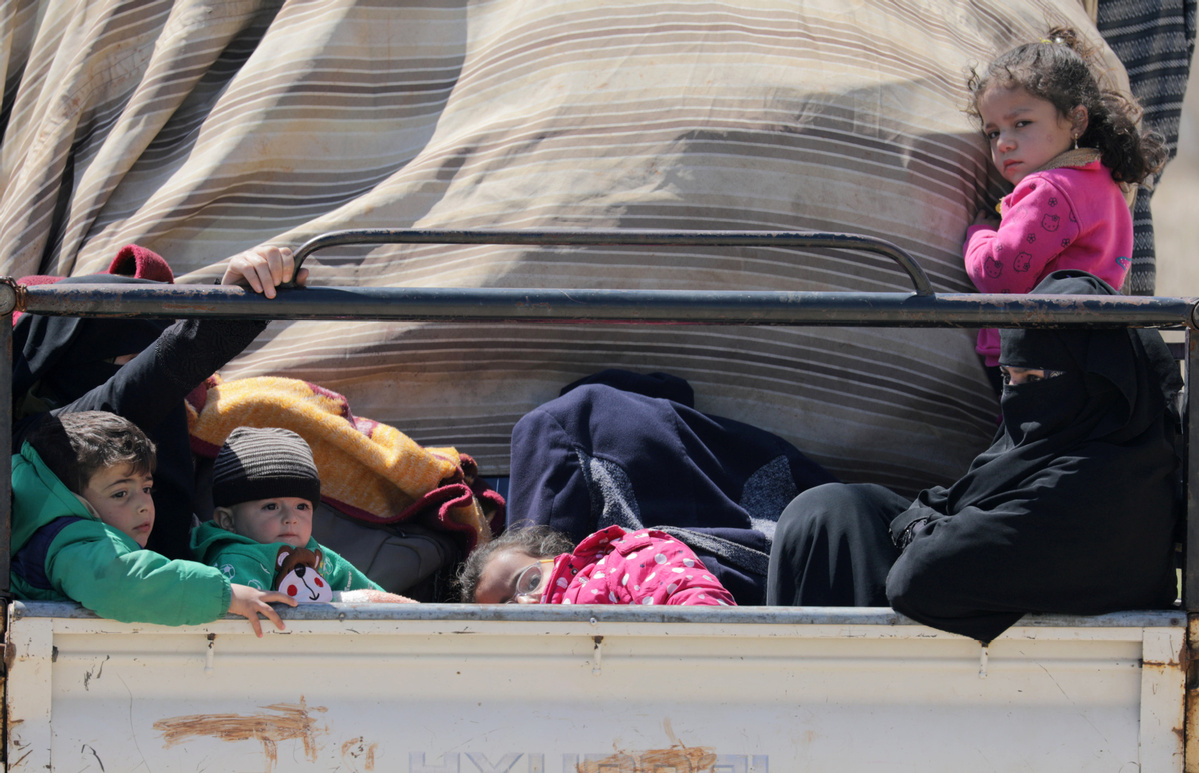
Displaced Syrian children ride on a back of a truck as they move back home, as some people are afraid of the COVID-19 outbreak in crowded camps, in Dayr Ballut, Syria, April 11, 2020. (Photo: Agencies)
UNITED NATIONS-UN Secretary-General Antonio Guterres' Middle East envoys have appealed for hostilities to end and for dialogue across the region amid the COVID-19 crisis. Guterres made an appeal for an immediate global ceasefire on March 23, urging all warring parties to pull back from hostilities, put aside mistrust and animosity, and silence their guns.
Many parties have responded positively to the Guterres appeal, but more needs to be done to translate words into action, the envoys say.
The envoys are Geir Pedersen, the UN special envoy for Syria; Jan Kubis, the UN special coordinator for Lebanon; Jeanine Hennis-Plasschaert, the UN secretary-general's special representative for Iraq; Martin Griffiths, the UN special envoy for Yemen; and Nickolay Mladenov, the UN special coordinator for the Middle East peace process.
Too many in the Middle East have endured conflicts and deprivation for far too long, and their suffering is now compounded by the COVID-19 crisis, they said.
"We call on all parties to engage, in good faith and without preconditions, on negotiating immediate halts to ongoing hostilities, sustaining existing ceasefires, putting in place more durable and comprehensive ceasefires, and achieving longer-term resolutions to the persistent conflicts across the region.
"We also appeal to all to exercise maximum restraint, de-escalate tensions and work to resolve differences through peaceful means. We further call on all to refrain from any activities that can lead to further deterioration of stability and security in any country or the region as a whole."
They urged parties to reach out across conflict lines and cooperate to stop the rapid spread of the virus and, where possible, to share resources, and allow access to medical facilities where needed.
They called on all sides to facilitate humanitarian access and assistance to internally displaced and refugees, communities under siege, and all who have been ravaged by war and deprivation, without prejudice or discrimination.
The envoys also called for special attention to the plight of the detained, the abducted and the missing, and for humanitarian releases, access for humanitarian organizations, and urgent steps to ensure adequate medical care and protective measures in all places of detention.
No country, region or community can face the challenge of COVID-19 alone, they said, adding that "solidarity is required today and will be very much needed tomorrow".
They promised to continue to focus on preventive diplomacy, on assisting all efforts to respond to the health and socio-economic consequences of the crisis, support cooperation, and work relentlessly to facilitate humanitarian access to the most vulnerable.
"None of these efforts will succeed if the guns of war and conflict are not silenced. At a time like this, partisanship and narrow interests must yield to the greater cause and the good of the people.
That is why we echo the secretary-general in calling on all parties in the Middle East to work with the United Nations so we can focus on the true fight of our lives."


